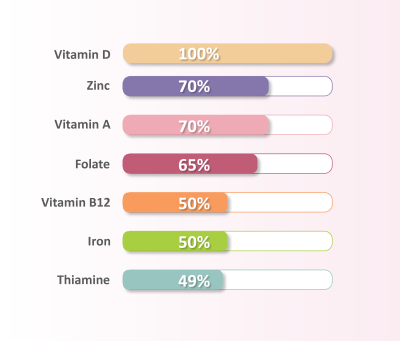Quelles carences nutritionnelles sont fréquentes après une intervention bariatrique ?
Quelles carences ?
Des études observationnelles* montrent que des carences majeures en Vitamine D, Zinc, Vitamine A, Folate, Vitamine B12, Thiamine et Fer ont été rapportées.
Les carences en calcium, vitamine B12, acide folique (vitamine B9), vitamine B1, cuivre, zinc, fer et vitamines liposolubles D, A et E sont les plus fréquentes. En fonction de vos valeurs sanguines, il peut être nécessaire, à côté d'une préparation multivitaminée/minérale et d'une préparation à base de calcium, de combler des carences en fer ou en vitamine B12 avec des compléments alimentaires.
Rappelez-vous, les suppléments standards ne suffisent pas après une chirurgie bariatrique, ils ont un dosage trop bas et ne sont pas bien absorbés. En conséquence, optez toujours pour des compléments bariatriques spécifiques pour rester en forme.
Comment reconnaître les carences ?
Les carences en vitamines et minéraux se développent le plus souvent au fur et à mesure. Au début, les symptômes sont plutôt vagues, mais après un certain temps, ils sont de plus en plus perceptibles. Les carences en vitamines et minéraux doivent être régulièrement détectées à l’aide d’analyses de sang. Parlez de votre opération avec votre médecin généraliste. Veillez à faire contrôler votre sang régulièrement dans le centre où vous avez été opéré ou chez votre médecin généraliste (la 1ère année tous les 3 mois, la 2ème année tous les 6 mois, et puis tous les ans).
Consequences of deficiencies?
General vitamin and mineral deficiency
Deficiency of minerals (such as zinc, magnesium, iron, copper, calcium, … ) and vitamins (such as vitamin A, B1, B6, B9, B12, C, D, E, …) deficiency leads to reduced health. Typical complaints are fatigue, trouble concentrating, insomnia, listlessness, muscle cramps, hair loss, …
General calcium deficiency
Calcium is important for bone formation and for the maintenance of strong bones. In case of long-term calcium deficiency, the body will extract calcium from the bones. This may lead to osteoporosis or bone decalcification and/or bone fractures. You may also suffer from confusion, forgetfulness, muscle cramps, muscle weakness, …
Specific vitamin B12 deficiency
Vitamin B12, a water-soluble vitamin, is important for the production of red blood cells and for a normal functioning of the nerves and brains. Vitamin B12 has to bind to the “Intrinsic Factor” for absorption into the body. The “Intrinsic Factor” is produced in the stomach. When part of the stomach has been removed, little to no intrinsic factor can be produced. Vitamin B12 deficiencies are thus inevitable. Lasting vitamin B12 deficiencies may lead to anemia through a decrease of the number of red blood cells, but also to neurological problems such as muscle weakness, confusion, forgetfulness, increased irritability, …
Specific iron deficiency
Iron is an important mineral that supports the production of red blood cells and helps to fight fatigue. An iron deficiency will be noticeable quite quickly: lack of energy, fatigue, headache, dizziness, concentration problems… A clear iron deficiency may reduce your immunity, leading to increased risk of diseases.
Specific vitamin D deficiency
Vitamin D is a fat soluble vitamin, obtained partly from sun exposure (UV light), through the skin, and partly from food. Vitamin D ensures a good immunity and strong bones and teeth by helping with the absorption of calcium and phosphorus from nutrition. In case of a lack of sun exposure and/or a low dietary intake, vitamin D deficiency may occur. Moreover, vitamin D deficiencies are very common among people who have undergone bariatric surgery. That is because vitamin D is stored mainly in the fat mass, as a result of which these people run a great risk of having a vitamin D deficiency already before bariatric surgery. A lasting vitamin D deficiency may lead to several disorders.
Don’t forget the proteins
Proteins are the building blocks of our bodies (bones) and help maintain muscle mass. In case of a lack of proteins, muscle atrophy may occur. After bariatric surgery, it may be difficult to take the daily recommended amount of proteins through nutrition. Supplementation may be recommended to help achieve this goal.








